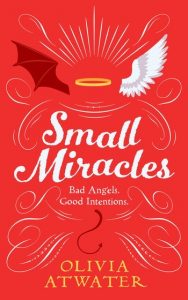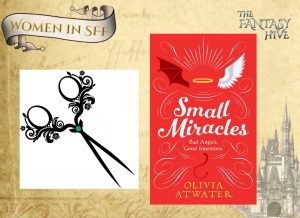Interview with Olivia Atwater (SMALL MIRACLES)
Olivia Atwater writes whimsical historical fantasy with a hint of satire. She lives in Montreal, Quebec with her fantastic, prose-inspiring husband and her two cats. When she told her second-grade history teacher that she wanted to work with history someday, she is fairly certain this isn’t what either party had in mind. She has been, at various times, a historical re-enactor, a professional witch at a metaphysical supply store, a web developer, and a vending machine repairperson.
Patreon: https://patreon.com/atwater_authors
Facebook: https://www.facebook.com/oliviaatwaterauthor
Goodreads: https://www.goodreads.com/oliviaatwaterauthor
BookBub: https://www.bookbub.com/profile/olivia-atwater
Welcome to the Hive, Olivia.
Firstly, congratulations on winning SPFBO 8 with your novel Small Miracles!
How did winning feel?
So, this is a funny story—and I know I’ve said it elsewhere, but it’s really true. Every time I received a good review in SPFBO, it happened to fall on a day where I was sick, exhausted, or otherwise hiding under the covers. Depending on your viewpoint, I suppose, I was either paying for my good reviews with terrible luck, or else SPFBO was cognisant of my misery and working very hard to make me feel better!
True to pattern, I was an absolute mess the day that I won SPFBO. Mr Atwater tip-toed into the room to gently prod at me, and I said “oh, I must have got a nice review, because I feel wretched today.” And he said “yes, something like that.”
So I’d like to say that I did a touchdown dance and went out to celebrate. But actually, I gave a little ‘yay’ and crawled back under the covers. A few days later, my stomach was finally stable enough that Mr Atwater made me my favourite dinner, and we had some sweets. Now that it’s had time to sink in, I am deeply proud of the win, though still genuinely surprised by it.
For readers unfamiliar with Small Miracles, what can they expect?
I’ve often described the plot of Small Miracles as ‘genderfluid angels and demons argue over chocolate’. Obviously, there’s more to it than that—there’s commentary on the nature of love and grief, lots of dramatic irony, and copious amounts of footnotes. In many respects, Small Miracles is an homage to Good Omens, but I wanted it to be a story about small-scale, personal catastrophes rather than world-ending ones.
Give us an insight into your characters, who can we expect to meet? Do you have a favourite child?
Oh, goodness, you had to make me choose. Well, I think Gadriel is probably my favourite character. Gadriel is the Fallen Angel of Petty Temptations. She’s not really out to damn humanity—she just thinks people need to enjoy the little pleasures and stop being so hard on themselves. She’s also got lots of questions about the Rules, and the more straight-laced angels really don’t like that.
What I really like about writing Gadriel is that while she isn’t a bad person, she’s definitely a petty person, in all possible respects. After thousands of years, she doesn’t see the problem with things like casual thievery or causing someone a bad day just because they annoyed her. But at the end of the day, she doesn’t want to hurt people deeply. In fact, she’d really like to see most people happier than they are.

Small Miracles has often been described as “cosy” fantasy; what do you make of the rise of this subgenre recently, what do you think is driving its popularity?
I think what’s popular tends to go in cycles. For a long while, grimdark fantasy was very popular. Now, we’ve swung back around to cosy fantasy. I’m sure we’ll go right back to grimdark fantasy at some point! But as to what’s causing the shift… there’s currently a lot of difficult conflict going on in the world. I think it only makes sense that once you’ve struggled with heavy conflict all day long, you might want to escape into something less charged for just a bit. Human beings simply aren’t built to handle intense stress 24/7, so there needs to be a release valve somewhere.
If you were transported into the world of Small Miracles, how do you think you would fare?
You know, that’s hard to say! In a lot of ways, I don’t fit neatly into my own setting. I’m not Christian anymore, so the angels and demons in the story wouldn’t be able to affect me. Some days I’m spiritual in a general sense and some days I’m agnostic and some days I feel atheist. So I guess for the most part, I’d drift along completely unaware of all the people being tempted or inspired around me.
Just for fun, how would you pitch Small Miracles as a 1-star review?
Absolutely nothing epic happens in this book! It’s all about small people and small problems. Nothing explodes, no one dies, and there’s way too much chocolate! And I don’t care if those angels have a thousand eyes and two extra faces, they still need to choose a single human gender and stick with it if they’re going to go around meddling in human affairs!
You also have a trilogy of Regency faerie tales beginning with Half a Soul. What can you tell us about this trilogy?
Oh, they’re very straightforward—exactly what it says on the cover! They’re faerie tales set in Regency England! I have an interest in classical faerie tales; I’ve always loved their structure, their simplicity, and the sense of whimsy that comes with them. So I wrote some faerie tales of my own, using all of those classic conventions. But because I have a bone to pick with royalist faerie tales (of which there are many), I also had to satirise the idea of inherently virtuous nobility while I was at it.
There’s magic and romance and plenty of faeries… but I think it’s safe to say that the nobility in the books are a bit more historically accurate, with their insular concerns and their callousness towards the lower classes.
As a Canadian author, what drew you to write about Regency England?
For a while, I had a job as a historical re-enactor. I actually learned a lot about Tudor England, specifically, but I also gained an accidental education in English history as a whole. I was surrounded, actually, by people with Masters degrees and PhDs in different English eras, and they loved telling me all about how the lower classes lived, because it’s so rarely discussed in mainstream media. If you’ve ever been around people who rant about their passions, you’ll know it can be very contagious. So I think on some level, I was always thinking about how I could work some of these interesting, lesser-known historical facts into a book.
When I first came up with the idea of Half a Soul, all I knew was that my main character had lost half of her soul, and that this caused her to be far less socially adept. I asked myself how best to set up a conflict around this, and obviously the Regency era seemed like the worst possible time period to be a woman who can’t read social cues. The Regency genre is also similar to classical faerie tales in many respects, with several Cinderella elements to it, so it made for a nice parallel. As soon as I’d decided on the Regency era, I bothered all of my old historical friends and found myself someone with a Regency thesis to consult—and then, the first book basically wrote itself!
Can you tell us anything about any upcoming projects? Or can you tell us a few teasers for your sequel?
I don’t know that I’ll ever write a sequel to Small Miracles. I never rule out something like that entirely, in case I’m later inspired to do so—but I had a very specific idea for the book, and I feel as though I’ve already wrapped up that idea nicely.
I am currently working on a Victorian faerie tale, however, which I’m very excited about! Now that I’m writing in the Victorian era, I get to explore the gothic genre, which is a bit darker. I still have some whimsy and some humour in the book, but I also get to flavour it more like a ghost story, and add a bit more gallows humour to it. The characters are allowed to be a bit more flawed, and the atmosphere feels more dangerous. This first Victorian faerie tale takes a lot of inspiration from the movie Labyrinth—so if you had a thing for David Bowie in eyeliner taunting the young heroine, this one might be for you.
Who are the most significant women in SFF who have shaped and influenced your work?
I’m immediately compelled to mention Tamora Pierce. I devoured her books when I was younger. It got to the point where the library always knew to order her new releases for me and keep them aside, because I’d be there on release day asking about them. Her Song of the Lioness series is still on my bookshelf, and it’s survived every single book purge in this household.
I have a strange love/hate relationship with Anne McCaffrey. I also devoured the Dragonriders of Pern… but I felt unaccountably betrayed when I realised she had hidden science fiction behind her dragons! I’m one of those people who eats my mashed potatoes and my vegetables separately, instead of squishing them together—so the idea of dragons in science fiction just offended some irrational, compulsive part of me, and I’ve never been able to forgive it!
Who is a great woman in SFF who we should be reading? Any hidden gems?
Intisar Khanani writes books that were made for me. She wrote Thorn, which is a retelling of The Goose Girl (one of my favourite faerie tales). Her books are young adult in the best sense, in that they follow younger characters as they question authority and grapple with their place in the world. My favourite thing about Intisar’s work is that she often puts her noble characters through an arc where they have to humble themselves, and that’s why I loved Thorn—it was, in some respects, a deconstruction of The Goose Girl. But it’s still a great, enjoyable book on its own merits, and it has this inexplicable spark of loveliness which I’m not sure I can fully explain.
If you want to recapture the feeling of someone reading a faerie tale to you when you were young, but you also want to read stories which challenge you a bit and make you think… that’s what I think Intisar’s books manage to do. They’re just beautiful.
Finally, what is the one thing you hope readers take away from your writing?
Every time I write a book, I hope to give my readers a new lens through which they can look at otherwise familiar things. That’s why I so often use faerie tales and historical eras as building blocks—they’re just distant enough from our everyday lives that we don’t get immediately defensive about them, but they’re still recognisable enough that we can apply our conclusions about them to things we see in the modern world around us.
Half a Soul was about the evils of too much politeness and not enough kindness… so readers who find that lesson resonates with them might think for a moment about what subjects they’ve been politely evading lately. Small Miracles is about the secret wonder of mundane, everyday things—so I hope readers come away from it with a new appreciation for the small things which make them happy.
Thank you so much for joining us for Women in SFF!

